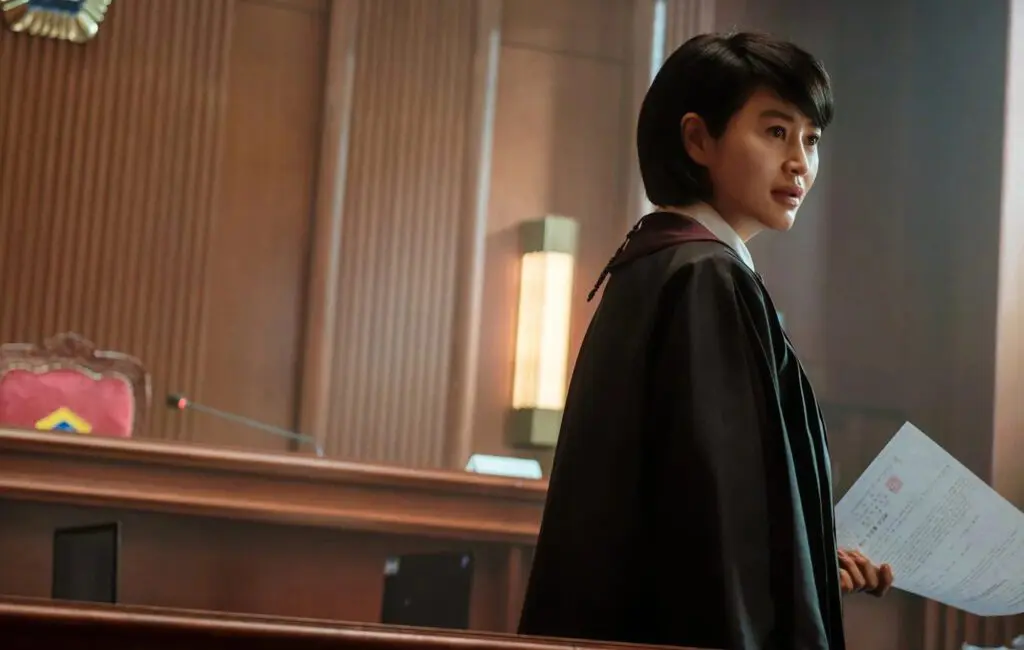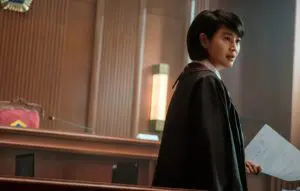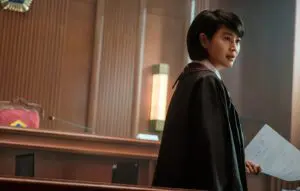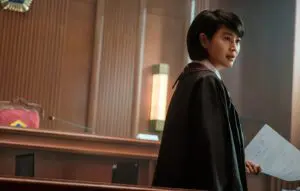Summary
Juvenile Justice, like the young offenders whose various macabre crimes it chronicles, never realizes its full potential.
This review of Juvenile Justice Season 1 is spoiler-free.
First of all, props to Juvenile Justice. It’s a serious South Korean drama about a complicated, contentious topic that isn’t afraid to be unflinching in its depiction of it. Despite all the problems I have with it – and there are a few! – I’m ultimately glad it exists and happy that it has been released in its entirety on Netflix, where a vast global userbase exposed to the relative majesty of Korean television thanks to Squid Game and All of Us Are Dead will be able to check it out. But, yeah… I have some problems.
First, premise. The show, directed by Jong-Chan Hong, focuses predominantly on Shim Eun-seok (Kim Hye-su), a judge who, by her own admission, vehemently despises young offenders and has earned the nickname “Judge Max” for always ensuring that juveniles who pass through her courtroom are given the maximum sentence. She’s appointed as a judge at a juvenile court and forced to contend with a variety of cases involving young people across ten hour-long episodes. In the meantime, her own position is alternately justified and challenged by the complex interplay of the education and justice systems, parenthood, mental illness, socioeconomics, and morality.
That sounds fine – good, even, and perhaps important were it handled the right way, which in many instances it isn’t. It becomes clear within the very first episode that Juvenile Justice has a problem with its writing – check the overabundance of relevant facts and statistics that are artlessly recounted at every opportunity – and tone, the latter being a particular issue that manifests in a few ways. On some level, the show wants to have its cake and eat it in terms of being a twisty-turny procedural crime thriller and a serious unpacking of the juvenile justice system. The cases are deliberately awful in a way that can feel provocative and lurid. On one hand, these kinds of things happen all the time, and juveniles have been responsible for some of the most abhorrent crimes in history, but on the other, it’s clear that we’re often playing for a deliberate, off-putting edginess here that can take away from some of the human drama at the show’s core.
That human drama is there, certainly, and is intermittently affecting, but it’s sometimes undercut by the show’s unclear stance on Eun-seok’s viewpoint. Another character, a prosecutor named Cha Tae-ju (Mu-Yeol Kim), is immediately introduced as Eun-seok’s moral opposite, someone who deeply believes in rehabilitation and the juvenile court’s responsibility to sustain relationships with young offenders long after their trials have concluded to coach them back into polite society. And yet he’s frequently proved wrong and naïve by Eun-seok. Showing why she feels the way she does is one thing, but tacitly endorsing her viewpoint even though it’s obviously contentious is quite another.
Of course, ten episodes is a lot, and with each one being an hour, there’s plenty of time for Eun-seok’s stance to soften, and for her to become more acutely aware of how the interplay of various factors helps to shape a young person’s mind, personality, and actions (which, for someone in her position, should be obvious anyway, but I digress). But on the way to this realization, there are plenty of uncomfortable scenes and developments that can be read explicitly as Juvenile Justice siding with its protagonist, or at least not properly challenging her. In a show with such a complex and nuanced topic at its core, this shouldn’t be the case.
Other downsides are understandable genre pitfalls. For instance, the Chief Judge, Kang (Lee Sung-min), is looking at a political appointment that requires the cases be downplayed and not subject to public scrutiny, but Eun-seok is well-known as a contentious figure and the inability of juvenile court to properly sentence juveniles almost irrespective of their crimes is a PR disaster waiting to happen. Kang would prefer every case to be open-and-shut and to be handled behind closed doors, so his job is essentially to scream at Eun-seok for trying to properly investigate a case – which, as a judge, she isn’t supposed to be doing anyway, but since we need some procedural elements to keep people engaged, she always ends up doing the deductive reasoning in person like Sherlock Holmes.
I don’t subscribe to the belief that all TV shows need a “likable” protagonist, but most need a clear point of view. Kim Hye-su delivers a tremendous performance here that the writing doesn’t always support, and the tendency for the script to devolve into preachy monologues does the whole thing a disservice. There’s interesting interplay between the show’s procedural and more serialized elements that makes the entire season dump an intriguing decision, but its overall tone can be grating in large doses, and it might have been better suited to the usual twice-weekly distribution that Netflix employs for most of its k-drama slate. Either way, there’s an interesting season of television here, just one that can’t quite live up to its full potential.
You can stream Juvenile Justice Season 1 exclusively on Netflix.




